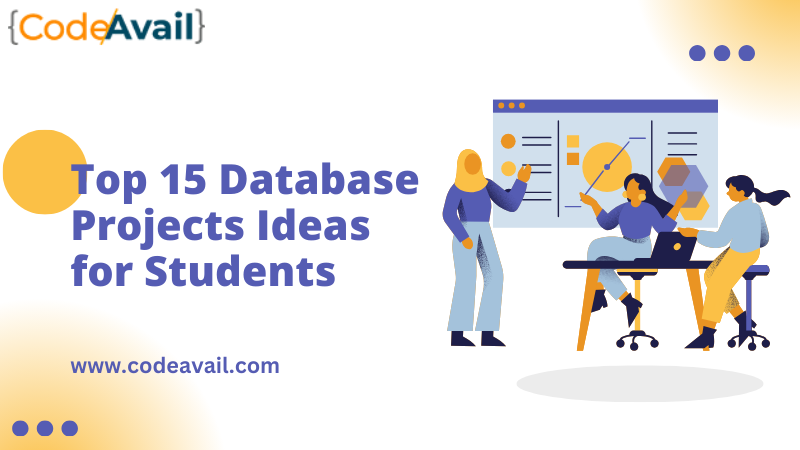In the rapidly advancing realm of technology, database projects have assumed an integral role within the education landscape. These projects serve as a bridge that connects the theoretical foundations of learning with the practical realities of the modern world. For students, the process of handpicking the perfect database project can be quite a daunting feat. The choices are vast, the possibilities are numerous, and the potential for growth is immense.
With that in mind, this comprehensive blog aims to be your guiding light in this journey. It will not only present you with a curated list of the top 15 database project ideas tailored for students but also provide the insight you need to make an informed decision, ensuring that your chosen project aligns seamlessly with your individual interests and evolving skillset. So, let’s embark on this educational adventure, exploring the exciting possibilities that database projects offer in today’s dynamic learning landscape.
Note: If you are a student and struggling with your Database Management Assignment, then you can get the best database management assignment help from our experts.
Why Database Projects are Important for Students?
Before delving into the project ideas, let’s understand why working on database projects is crucial for students. Database projects provide hands-on experience and offer several advantages, such as:
- Bridging the gap between theory and practice.
- Enhancing problem-solving skills.
- Improving understanding of database concepts.
- Preparing students for real-world challenges.
- Building an impressive portfolio for future career opportunities.
Now, let’s explore the top 15 database project ideas that students can consider.
Top 15 Database Project Ideas
1. Basic Student Database
Create a database system to manage student information, including their personal details, courses, and grades.
2. Library Management System
Design a database for a library to track books, borrowers, due dates, and available copies.
3. E-commerce Website Database
Develop a robust database for an e-commerce platform to manage product listings, customer accounts, and orders.
4. Hospital Management System
Build a database for a hospital that tracks patient records, appointments, and medical histories.
5. Inventory Management System
Create a system to manage inventory for a business, helping track product availability and sales.
6. Social Media Platform Database
Design a database to support a social media platform, storing user profiles, posts, and interactions.
7. Online Banking System
Develop a secure database for online banking, handling transactions, user accounts, and security protocols.
8. Online Food Ordering System
Create a database system for online food ordering, managing menus, orders, and delivery details.
9. Travel Booking System
Build a database for a travel agency, storing information about destinations, itineraries, and bookings.
10. Employee Management System
Design a database for HR purposes, tracking employee details, payroll, and attendance.
11. Student Attendance System
Develop a database to record student attendance in educational institutions.
12. Movie Database System
Create a comprehensive database for movies, including information about actors, directors, and ratings.
13. Real Estate Management System
Design a database for a real estate agency to manage property listings, clients, and transactions.
14. Online Quiz System
Develop a database for online quizzes, storing questions, user responses, and scores.
15. Personal Finance Tracker
Create a database that helps individuals manage their personal finances, including income, expenses, and investments.
How to Choose the Right Database Project?
Selecting the right database project is a pivotal decision in your academic journey, and it should be made with careful consideration. To help you navigate this crucial process, here are several steps to ensure that you choose the ideal project:
Self-Reflection
Start by reflecting on your interests and passions. Think about the areas of technology or business that excite you the most. A project aligned with your interests will not only keep you engaged but also be a source of personal satisfaction.
Assess Your Technical Skills
Evaluate your current technical skills. Consider your proficiency in database management systems, programming languages, and data manipulation. It’s essential to choose a project that matches your skill level, ensuring you can complete it successfully.
Project Complexity
Understand the complexity of each project option. Some projects may be relatively simple, suitable for beginners, while others may be more advanced and require in-depth knowledge. Select a project that challenges you but is within your current skill range.
Educational Goals
Ensure that your chosen project aligns with your educational goals. It should contribute to your learning and help you apply what you’ve studied in your courses. A well-chosen project can reinforce your academic knowledge.
Room for Growth
Consider the growth potential of the project. The best projects not only fulfill your current objectives but also open doors for future learning and career opportunities. Look for projects that can be expanded or used in a portfolio to impress potential employers.
Seek Guidance
Don’t hesitate to seek guidance from professors, mentors, or peers. They can provide valuable insights, suggest suitable projects, and offer support throughout your project journey.
Review Project Requirements
Carefully read the project requirements and constraints. Make sure you have access to the necessary tools and resources required for the project’s successful completion.
Personal Challenge
While considering your interests and skills is vital, also choose a project that challenges you. Growth often comes from stepping out of your comfort zone and tackling more complex tasks.
By following these steps, you can make an informed decision and select a database project that not only matches your abilities and interests but also aligns with your educational objectives, ensuring a rewarding and enriching learning experience.
Benefits of Working on Database Projects
Working on database projects offers several benefits, such as improving your problem-solving abilities, enhancing your technical skills, and creating a strong portfolio that will impress future employers.
Building Your Database Project Step by Step
Creating a database project is a structured journey that unfolds step by step, ensuring that the end result is not just functional but also well-planned and efficient. Here are five essential steps to guide you through the process:
- Defining the Project Scope: The initial step is defining the scope of your database project. This involves identifying the purpose, goals, and intended functionalities of your database. You’ll need to answer questions like what data will be stored, who will use it, and what problems it should solve. This phase sets the foundation for the entire project.
- Designing the Database Structure: Once the scope is clear, the next step is designing the database structure. This includes creating a schema that outlines the tables, relationships, and data types. A well-structured database is essential for efficient data management.
- Implementing the Database: With the design in place, it’s time to implement the database. This involves setting up the database management system, creating tables, and defining relationships. Depending on the project’s complexity, you may need to write scripts or use database software.
- Populating Data: After setting up the structure, you’ll need to populate the database with data. This can involve manual data entry, data import, or integration with other systems. Ensuring accurate and complete data is crucial.
- Testing Functionality: The final step is testing the functionality of your database project. This includes running queries, checking for data integrity, and ensuring that the system performs as expected. Testing helps identify and rectify any issues before the project is ready for use.
Conclusion
Database projects are a valuable part of a student’s educational journey. They provide a bridge between theoretical knowledge and practical skills. By working on these projects, students gain a deep understanding of databases and improve their problem-solving abilities, making them well-prepared for the workforce.





